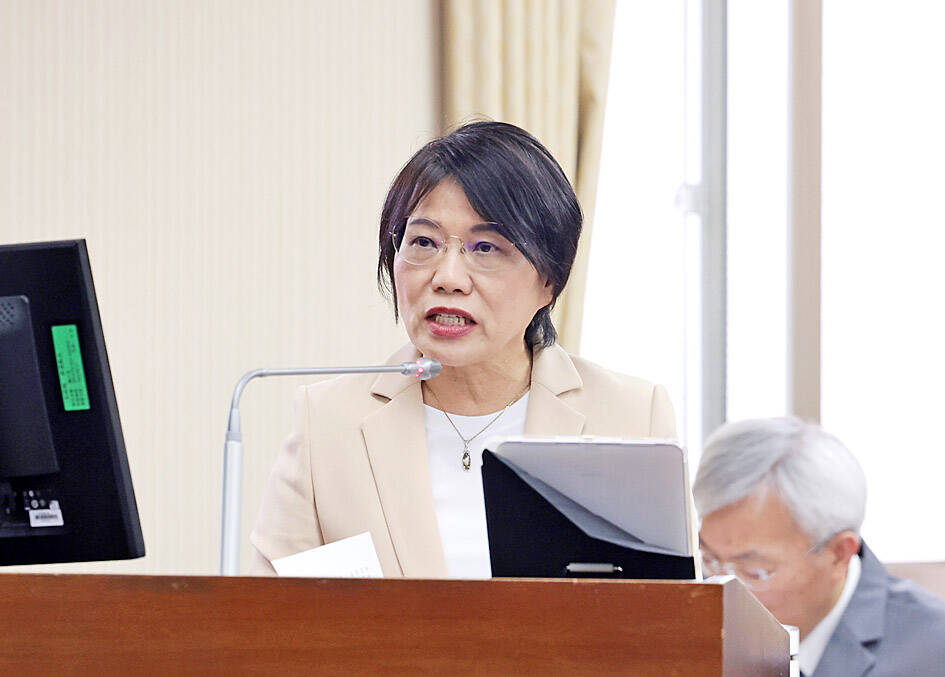Taiwan is to bolster critical infrastructure security with a force of 1,811 police officers before the end of the year, Minister of the Interior Liu Shyh-fang (劉世芳) said during a question-and-answer session at the legislature yesterday.
The officers — to be drawn from the National Police Agency’s Second Special Police Corps — would guard the nation’s key oil, water, electricity and telecom facilities against sabotage, Liu told the Legislative Yuan’s Internal Administration Committee.
The Second Police Corps would receive additional personnel, equipment and training resources for the task, she said, adding that joint response drills against specific threats would be employed to ensure police effectiveness.

Photo: CNA
The Ministry of the Interior is to continue building resilience in local communities and expanding a disaster relief volunteer certification program to mitigate the effects of natural disasters, she said.
The ministry is enhancing its collaboration with groups, schools and other government departments to grow the 26,000-member disaster relief volunteer force to 50,000 by the end of the year, she said.
Additionally, from January to last month, the police closed 12,028 fraud investigations, busting 691 scam organizations and arresting 6,358 suspects, Liu said.
Police cut 626 phone lines being used for fraud, stopped 5,170 fraudulent schemes and prevented the loss of NT$305 million (US$9.44 million) to scams, she said.
The ministry drafted proposed laws on police use of forensic technology and communication security, and preventing fraud and money laundering, which the Executive Yuan has submitted to lawmakers for review, she said.
The ministry is to implement President William Lai’s (賴清德) policy to increase social housing to 1 million units, Liu added.
The initiative would add 250,000 new homes, 250,000 units under a subleasing and management service system and 500,000 subsidized units, she said.
The ministry aims to break ground on all of the initiative’s construction projects in northern Taiwan in two years and reach its 1 million social housing units goal in eight years, she said.
The government approved 1,152 urban renewal projects and 3,599 initiatives to repair or replace condemned buildings from January to last month, Liu said.
That marked a sevenfold increase in approved projects from the first five months of 2017, before the current urban renewal rules were implemented, she said.
The rise underscores the ministry’s need to revamp the process for approving and subsidizing such projects toward improving the speed of approvals and offering more incentives, she said.

The Grand Hotel Taipei on Saturday confirmed that its information system had been illegally accessed and expressed its deepest apologies for the concern it has caused its customers, adding that the issue is being investigated by the Ministry of Justice Investigation Bureau. The hotel said that on Tuesday last week, it had discovered an external illegal intrusion into its information system. An initial digital forensic investigation confirmed that parts of the system had been accessed, it said, adding that the possibility that some customer data were stolen and leaked could not be ruled out. The actual scope and content of the affected data

DO THEY BITE IT? Cats have better memories than people might think, but their motivation is based entirely around the chance of getting fed Cats can remember the identity of the people who fed them the day before, Taipei-based veterinarians said on Friday, debunking a popular myth that cats have a short memory. If a stray does not recognize the person who fed them the previous day, it is likely because they are not carrying food and the cat has no reason to recognize them, said Wu Chou Animal Hospital head Chen Chen-huan (陳震寰). “When cats come to a human bearing food, it is coming for the food, not the person,” he said. “The food is the key.” Since the cat’s attention is on the food, it

‘LIKE-MINDED PARTNER’: Tako van Popta said it would be inappropriate to delay signing the deal with Taiwan because of China, adding he would promote the issue Canadian senators have stressed Taiwan’s importance for international trade and expressed enthusiasm for ensuring the Taiwan-Canada trade cooperation framework agreement is implemented this year. Representative to Canada Harry Tseng (曾厚仁) in an interview with the Central News Agency (CNA) said he was increasingly uneasy about Ottawa’s delays in signing the agreement, especially as Ottawa has warmed toward Beijing. There are “no negotiations left. Not only [is it] initialed, we have three versions of the text ready: English, French and Mandarin,” Tseng said. “That tells you how close we are to the final signature.” Tseng said that he hoped Canadian Prime Minister Mark Carney

President William Lai (賴清德) yesterday bestowed one of Taiwan’s highest honors on Saint Vincent and the Grenadines (SVG) Ambassador Andrea Clare Bowman in recognition of her contributions to bilateral ties. “By conferring the Order of Brilliant Star with Grand Cordon on Ambassador Bowman today, I want to sincerely thank her, on behalf of the Taiwanese people, for her outstanding contribution to deepening diplomatic ties between Taiwan and SVG,” Lai said at a ceremony held at the Presidential Office in Taipei. He noted that Bowman became SVG’s first ambassador to Taiwan in 2019 and